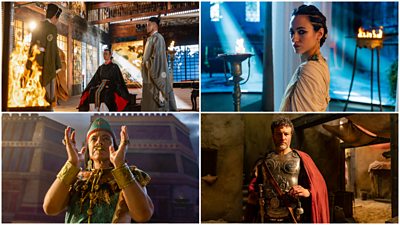
A new series of Civilisations is always a significant moment for BBC Arts and this incarnation feels particularly timely in our own uncertain age.
At a moment when we all fear the civilisation-threatening power of pandemics, autocracy and technological transformation, Civilisations: Rise and Fall, produced by BBC Studios, examines why four famous and mighty civilisations in the past found themselves on the brink of disaster, and how the art and artefacts they left behind hold clues to explaining their fate.
Each programme looks at the rise of a different great civilisation and explores the factors that led to its decline. From Ancient Rome to Cleopatra’s Egypt, via the samurai of Japan and the lost world of the Aztecs, audiences will discover rare and beautiful art and artefacts from each culture. All objects that feature in the series are in the British Museum thanks to behind-the-scenes access to spaces most visitors never see. These artefacts take us to very particular moments of civilisational transition, as societies confronted upheaval and endured radical change in a bid to safeguard their own futures.
Across four episodes, interviews with experts, key academics and curators are combined with bold drama-reconstructions to follow the clues in these treasures that explain why each culture fell from power, and whether these relics can help us understand the risks we face today.
Contributors include Dominic Sandbrook from The Rest is History podcast, artists Antony Gormley and Edmund De Waal, co-host of The Rest is Politics podcast Alistair Campbell, Radio 4’s Making History presenter Iszi Lawrence and academics and authors including Camilla Townsend, Mark Ravina, Shushma Malik and Salima Ikram.
Featured artefacts from The British Museum’s world-famous collection include the double-headed serpent of the Aztecs, the Meroe Head of Augustus, a mummified crocodile from Ancient Egypt and a newly acquired set of samurai armour from Japan.
Suzy Klein, Head of BBC Arts and Classical Music TV, said: “A new series of Civilisations is always a significant moment for BBC Arts and this incarnation feels particularly timely in our own uncertain age. With unprecedented access to the British Museum’s collection, Civilisations: Rise and Fall makes the case that museums are more relevant than ever: they are repositories of human memory, time-capsules – a crucial way for us to understand the past and how we might ensure the future of our own civilisation.”
Dr Nicholas Cullinan, Director of the British Museum said: “We were delighted to collaborate with the BBC for the landmark Civilisations series, and bring some of the most incredible objects in the British Museum’s collection to the forefront in telling these global stories. I hope the series captures the imagination of young and old alike, and that we engage whole new audiences with our collection – a collection which shows how history connects us all, something which is now more relevant than ever.”
Alexander Leith, Executive Producer, BBC Studios Specialist Factual, said: “It’s a great privilege to be making the next iteration of the Civilisations brand – especially in such close collaboration with the British Museum. The remarkable artefacts they hold offer astonishing points of connection with these past civilisations, and the factors and fault lines on which their fortunes turned – many of which feel disarmingly relevant to our own world.
The Civilisations
The Fall of Rome
When new Roman emperor Honorius ascends to the throne in 395 AD he inherits a system of government that’s built one of the most remarkable civilizations in history. For over 400 years the Roman Empire has ruled a vast territory that crosses three continents and encompasses a multitude of peoples and languages. Keeping this disparate whole together is a massive challenge, but decisions taken by Honorius’ predecessors have opened up alarming fault lines within the system. Now a series of shocks and threats are colliding in a perfect storm that will see the weakened city of Rome fall to foreign invaders for the first time in 800 years.
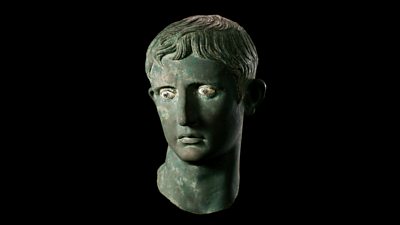
The Last Days of the Ptolemies in Egypt
In 51 BC Cleopatra becomes Queen of Egypt – and Pharaoh – amid a crumbling dynasty plagued by infighting, betrayal, and political chaos. She navigates a treacherous web of family rivalries and Roman interference. Determined to preserve Egypt’s independence, she forges bold alliances with Julius Caesar and later Mark Antony, two of Rome’s most powerful men. Her reign marks both a last stand for the Ptolemaic dynasty and the dramatic end of three millennia of Pharaonic rule in Egypt.
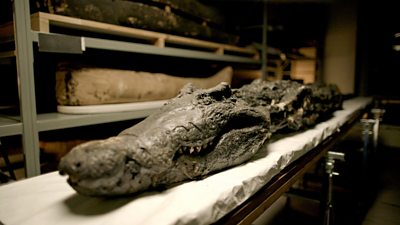
The End of the Samurai in Japan
1853 CE. For centuries, Japan has been cut off from outside influence. In that time the West, and much of the rest of the world, has made extraordinary leaps forward in science, industry and military technology, while Japan remains a feudal medieval society. At the heart of this feudal system are the samurai – warrior knights funded by the state. But when giant American steamships arrive on Japan’s shores, the days of the samurai are numbered.
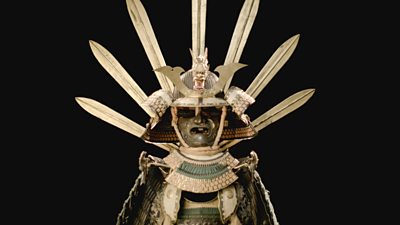
The Collapse of the Aztec Empire
1519. Under the strong leadership of Emperor Moctezuma the great Aztec civilization reaches its zenith. The jewel in the crown is the beautiful island city of Tenochtitlan built in the middle of the lake Texcoco, a melting pot of extraordinary arts and culture – home to some 100,000 people. But Moctezuma’s empire is fragile. He relies on ritual wars, gathering tribute and maintaining social and religious order through slavery and sacrifice. In doing so he has tightened his grip on the largest South American empire the world had ever seen – but he has made many enemies. The arrival of the Spanish in 1519, under Hernan Cortes, will prove disastrous for the Aztecs.
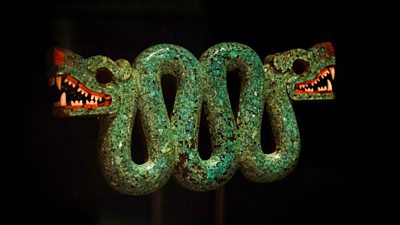
Civilisations: Rise and Fall is a BBC Studios Specialist Factual Unit production for BBC Arts, with BBC Studios handling global distribution. The Executive Producer is Alexander Leith, the Series Producer is Tony Mitchell, and the Production Manager is Emma Hyland. It was commissioned for the BBC by Suzy Klein, BBC Head of Arts and Classical Music. The Commissioning Editor for the BBC is Alistair Pegg.
Founded in 1753, the British Museum was the first national public museum in the world. The collection tells the stories of cultures across the world, from the dawn of human history, over two million years ago, to the present. Objects range from the earliest tools made by humans and remarkable finds from the ancient world to more recent acquisitions from Africa, Oceania and the Americas, the Middle East, Asia and Europe, as well as the national collections of prints and drawings, and coins and medals.
BBC Studios Specialist Factual Productions is a bespoke unit making premium output in the history, art, music and culture space. The work is underpinned by journalistic rigour and specialist knowledge, bringing together diverse voices to ignite conversation and challenge preconceptions. Recent titles include the Grierson Award winning Inside Our Autistic Minds, the RTS winning Fight The Power: How Hip Hop Changed the World with Public Enemy’s Chuck D, the true crime / natural history hybrid The Great Rhino Robbery and cold war thriller Secrets and Spies: A Nuclear Game.
AM2



No Comment! Be the first one.